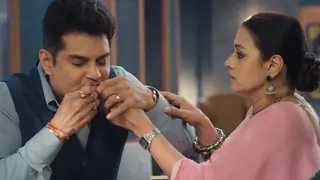Part V.3
The next day, they left Ishan at his grand parent's place and went to Dr.Tripriwala's therapy centre. While they waited for his arrival, Geet looked at her husband with concern.
"Maan, how do you feel about this?" asked Geet, unsure of whether Maan was comfortable with the prospect of discussing his problems with a stranger.
"Geet, nothing is more important to me than my family. I will do whatever it takes to ensure that I don't jeopardize their peace and happiness."
Geet was relieved to hear him say this.
Dr.Tripriwala arrived after a few minutes. He was portly man of around fifty years old.
"Good morning, Mr.Khurana," he wished him genially.
"Good morning. You can call me Maan."
"OK, Maan. I understand that you have a problem controlling your anger."
Maan silently nodded his head and looked down in shame.
"Don't worry, there is nothing to be ashamed of. We'll tackle your problem together. Remember, anger is a completely normal and usually a healthy human emotion but it creates problems when it gets out of control and turns destructive. It then affects your work, your personal relationships, and the overall quality of your life."
"Nobody can understand that better than me," Maan said wryly.
"Have you ever wondered why some people are more 'hot headed' than others?" Pushing his specks up his nose, Dr.Tripriwala asked both Maan and Geet.
Hearing the word 'hot-headed', Maan shifted uncomfortably in his chair while Geet turned to look at him indulgently, with a smile at the corner of her lips.
Dr.Tripriwala noticed their non-verbal gestures but continued as though he hadn't. "They get angry more easily and more intensely than the average person does. Angry people have different ways to display their anger. Not all of them show their anger in loud spectacular ways such as cursing and throwing things; Some are chronically irritable and grumpy; some withdraw socially, sulk, or get physically ill. People who are easily angered generally have what some psychologists call a low tolerance for frustration. This simply means that they feel that they should not have to be subjected to frustration, inconvenience, or annoyance. They can't take things in stride, and they're particularly infuriated if the situation seems somehow unjust."
"You just described my husband in those last sentences, Dr.Tripriwala," said Geet as she exchanged knowing glances with her husband. Maan nodded in agreement.
Dr.Tripriwala smiled. "What makes these people this way? There are a number of reasons for this. One cause may be genetic or physiological. There is evidence that some children are born irritable, touchy, and easily angered, and that these signs are present from a very early age. Another may be socio-cultural. Anger is often regarded as a negative emotion. We are taught that it's all right to express anxiety, depression, or other emotions but are discouraged from freely express anger. As a result, we don't learn how to handle it or channel it constructively. Research also shows that family background plays a role. Typically, people who are easily angered come from families that are disruptive, chaotic and not skilled at emotional communications."
Maan looked contemplatively as Dr.Tripriwalla continued with his lecture.
"Anger can be caused by both external and internal events. You could be angry at a specific person or event, or your anger could be caused by worrying or brooding about your personal problems. What triggers your anger, Maan?"
"I cannot tolerate people being taken advantage of or exploited. I lose my temper and turn violent."
"Do you feel that you're at the mercy of an unpredictable and powerful emotion when you get into these fits of rage?"
Maan nodded his head vigorously.
"How long have you been having this problem of uncontrollable rage? I am asking you this question since sometimes memories of traumatic or enraging events can also trigger angry feelings."
Maan paused for a second and told him about his background and his difficult teen years and how over the years his anger grew along with him.
"Maan, anger is a natural, adaptive response to threats. It inspires powerful, often aggressive feelings and behaviour, which allow us to fight and to defend ourselves when we are attacked. A certain amount of anger, therefore, is necessary to our survival. I understand that your anger initially started off as a self preservation mechanism. At the same time, we can't physically lash out at every person or object that irritates or annoys us, can we? Laws, social norms, and common sense place limits on how far our anger can take us."
"I know that but am unable restrain myself when I'm confronted with instances of gross unfairness, prejudice and exploitation. I, then, turn totally irrational and lash out at the perpetrator. I want to control and manage my anger, but often fail to do so," Maan tried to explain his inadequacies.
"I perfectly understand your state of mind, Maan. To resolve your problem with anger, you need to first accept your inner rage and hate, find their sources, express them in appropriate places, and watch them dissipate as a result. I know it is not easy, but it is the only lasting solution. Spewing vitriolic anger and hatred can temporarily make you feel calmer and less stressed. But that violent process of releasing anger is really a temporary calming device. It works, but not for long. Very soon another situation arises which causes you to be angry and again you end up feeling the need to vent your anger.
There is a difference of opinion among various therapists regarding whether anger should be avoided entirely or should some or all of it be brought out. I believe it is important to accept the inner feelings of anger and hate so that they may be tackled."
Dr.Tipriwala got up from his seat and walking up to a white board hanging on the wall behind him, he wrote down the words 'expressing', 'suppressing' and 'calming'. Both Geet and Maan looked at him quizzically.
The doctor elaborated on what he had written, "There are three main approaches to tackle anger --- expressing, suppressing, and calming. Expressing your angry feelings in an assertive manner ---mind you, I am using the term assertive and not aggressive--- is the healthiest way to express anger. Being assertive doesn't mean being pushy or demanding. It means being respectful of yourself and others. To do this, you have to learn how to make clear what your needs are, and how to get them met, without hurting others.
The second way to tackle anger is to suppress it and then convert or redirect it to more constructive behaviour. This happens when you hold in your anger and focus on something positive. The danger in this type of response is that if it isn't allowed outward expression, your anger can turn inward---on yourself. Anger turned inward can cause health problems such as hypertension or depression. Unexpressed anger can create psychological problems too. It can lead to pathological expressions of anger, such as passive-aggressive behaviour where, instead of confronting people them head-on, you get back at indirectly without telling them why. You could end up being perpetually cynical and hostile. People who are constantly putting others down, criticising everything, and making cynical comments haven't learned how to constructively express their anger. Not surprisingly, such people aren't likely to have many successful relationships.
The third approach to tackling anger is to calm down from within. This means not just controlling your outward behaviour, but also controlling your internal responses -- take steps to lower your heart rate, calm yourself down, and let the feelings subside. When you don't use any of these three techniques, you turn to aggression which is bound to not only hurt someone but will also hurt you."
Geet and Maan exchanged glances at each other again. Maan knew only too well that his aggression not only hurt his wife but also caused him pain for he could not bear to see her hurt.
Dr.Tripriwala carried on his discourse."The goal of anger management is to reduce both your emotional feelings and the physiological arousal that anger causes. You can't get rid of, or avoid the things or the people that enrage you, nor can you change them, but you can learn to control your reactions to them, can you not?"
Maan nodded his head understandingly.
Returning back to his seat, Dr.Tripriwala continued. "Allowing anger to erupt actually escalates anger and aggression and does nothing to help you resolve the situation. It's best to find out what it is that triggers your anger, and then to develop strategies to keep those triggers from tipping you over the edge. Simple relaxation tools, such as deep breathing and relaxation, can help calm down angry feelings. There are books and courses that can teach you relaxation techniques, and once you learn the techniques, you can them in any situation."
The doctor then made him sit on the clinical table. Putting his hand on Maan's shoulder he said, "Now, breathe deeply from your diaphragm."
Seeing Maan breathe, he said, "No, not like that. Breathing from your chest won't relax you. Picture your breath coming up from your 'gut'. Slowly repeat a calm word or phrase such as 'relax' or 'take it easy.'"
Maan did as he was told.
"Now, repeat it to yourself while breathing deeply. Use imagery and visualize a relaxing experience, from either your memory or your imagination. Non-strenuous, slow yoga-like exercises can relax your muscles and make you feel much calmer. Practice these techniques daily. Learn to use them automatically when you're in a tense situation."
Maan nodded his head.
Shaking his hand Dr.Tripriwala said, "I think we have had enough for a day. I will see you next week. When I meet you next I want you to tell me how much progress you have made during this week."
Maan nodded his head again and thanked him.
Over the next week, Maan faithfully practiced the breathing exercises. Geet tested him by provoking him many a times, but Maan held back his irritation by breathing deeply and employing the relaxing techniques.
During the next sitting which Maan attended on his own, Dr.Tripriwala spoke to him about cognitive restructuring.
Seeing Maan's confused expression, he said, "We psychologists come up with big words for simple things. What it means in layman's language is, changing the way you think. Angry people tend to curse, swear, or speak in highly colourful terms that reflect their inner thoughts. When you're angry, your thinking can get highly exaggerated and overly dramatic.
Try replacing these thoughts with more rational ones.
For instance, instead of telling yourself, 'oh, it's awful, it's terrible, everything's ruined, I need to seek my vendetta', tell yourself, 'I know it's frustrating, and it's understandable that I'm upset about it, but it's not the end of the world and getting angry is not going to fix it anyhow.'
Be careful using words like 'never' or 'always' when talking about yourself or someone else. These words are not just inaccurate, they also serve to make you feel that your anger is justified and that there's no way to solve the problem. They also alienate and humiliate people who might otherwise be willing to work with you on a solution. Remind yourself that getting angry is not going to fix anything. It won't improve things or make you feel better but may actually make you feel worse.
Angry people tend to jump to, and act on, conclusions, and some of those conclusions can be very inaccurate. If you're in a heated discussion, the first thing to do is slow down and think through your responses. Don't say the first thing that comes into your head, but slow down and think carefully about what you want to say. At the same time, listen carefully to what the other person is saying and take your time before answering. It's natural to get defensive when you're criticised, but don't fight back. Instead, listen to what underlying the words convey. It may take a lot of patient questioning on your part, and it may require some breathing space, but don't let your anger let a discussion spin out of control. Keeping your cool can keep the situation from becoming a disastrous one. "
Pausing for a minute in between his lengthy discourse, Dr.Tripriwala removed his glasses and looked at Maan with a glint in his eyes.
"You know something Maan? Sometimes humour can do the trick. It can help you get a more balanced perspective. When you get angry and want to call someone a name, stop and picture what that word would literally look like. For example, if you're at work and you think of a co-worker as a 'scumbag', picture a large bag full of dirt sitting at your colleague's desk, talking on the phone and going to meetings."
Imagining this vision, Maan smiled at the doctor.
"Do this whenever you feel like using expletives. If you can, draw a picture of what the actual thing might look like, it will take a lot of the edge off your fury and prevent you from actually using the curse word. Thus, humour can always be relied on to help unknot a tense situation.
Angry people tend to feel that they are morally right, that any blocking or changing of their plans is an unbearable indignity and that they should NOT have to suffer this way. When you feel that urge, picture yourself as a god or goddess, a supreme ruler, who owns the streets and stores and office space, striding alone and having your way in all situations while others defer to you."
Maan laughed heartily, imagining the things Dr.Triwala asked him to imagine.
Mr.Tripriwala continued, "The more detail you can get into your imaginary scenes, the more chances you have to realise that maybe you are being unreasonable in trying to find quick fix solutions through violent means. There are, however, two things you need to note about using humour. First, don't try to just 'laugh off' your problems. Instead, use humour to help yourself face them more constructively. Second, don't give in to harsh, sarcastic humour. That's just another form of unhealthy anger expression. What these techniques have in common is a refusal to take yourself too seriously. Anger is a serious emotion, but it's often accompanied by ideas that, if examined, can make you laugh.
Sometimes it's our immediate surroundings that give us cause for irritation and fury. Problems and responsibilities can weigh on you and make you feel angry at the 'trap' you seem to have fallen into and all the people and things that form that trap. Give yourself a break. Make sure you have some 'personal time' scheduled for times of the day that you know are particularly stressful."
Maan nodded his head purposefully.
"Logic defeats anger, because anger, even when it's justified, can quickly become irrational. So use cold hard logic on yourself. Try to have a more balanced perspective. Angry people tend to demand things such as fairness, appreciation, agreement and willingness to do things their way. Everyone wants these things, and we are all hurt and disappointed when we don't get them, but angry people demand them, and when their demands aren't met, their disappointment turns to anger. In your case you want a perfect world and demand it. As part of your cognitive restructuring, you need to become aware of this demanding nature of yours and translate your expectations into desires. When you're unable to get what you want, you will experience the normal reactions such as frustration, disappointment and hurt but not anger. Some angry people use their anger as a way to avoid feeling hurt, but that doesn't mean the hurt will go away.
Your anger and frustration are caused by very real and inescapable problems. Not all anger is misplaced, and often it's a healthy, natural response to these difficulties. Every problem has a solution but the solution is not violence. There are several other ways to address the problem. If you feel that the society needs to be changed, change it. Start a peaceful movement that will awaken the general public to the ills of the society and help you find a more peaceful and lasting solution to the problem. Make a plan, and check your progress along the way. Resolve to give it your best, but do not punish yourself if an answer doesn't come right away. If you can approach it with your best intentions and efforts and make a serious attempt to face it head-on, you will be less likely to lose patience and fall into all-or-nothing thinking, even if the problem does not get solved right away.
Remember, you can't eliminate anger and it wouldn't be a good idea if you could. In spite of all your efforts, things will happen that will cause you anger; and sometimes it will be justifiable anger. Life will be filled with frustration, pain, loss, and the unpredictable actions of others. You can't change that; but you can change the way you let such events affect you. Controlling your angry responses can keep them from making you even more unhappy in the long run.
You can decide that you will not have feelings of hate or rage under identical circumstances in the future but this is more often easier said than done. It may take you months or years to completely get the blinding rage out of your system. But having the wish/goal/intent to make such a change is important in propelling you along your best path."
"Believe me, Dr.Tripriwala. It is more than a wish to rid myself of this blinding rage. It is now my life's mission. I cannot afford to lose the two most important beings in my life to it. I assure you of my complete co-operation and will be patient and persevering till I achieve this goal."
"I am pleased to see such determination, Maan. We'll meet next week and continue with this therapy."
It had taken nearly six months of therapy for Maan to completely rid himself of his rage. Geet was like the pillar of rock right through the therapy period.
Maan wanted to channelise his rightful indignation at society's ills into something productive rather than something destructive. Geet suggested that he start a non-government organization and mobilise support from like-minded people. Maan thought this was a good idea and started an organization called "Friends of the Society". The organization elicited support of people from all walks of life. Professionals like doctors, engineers, lawyers, accountants and others joined the organization. The organization not only sought to redress the complaints of affected people through the mechanism of public outcry but also helped these people through financial and other means to cope with their problems. Geet donated a large chunk of the wealth Mohinder had given her to the organization. Seeing the vast improvement in Maan's behaviour and his sense of responsibility, Mohinder wanted him to join his Group of companies at the CEO but Maan declined saying that he will join the Group as an ordinary salaried employee and work his way up. Mohinder was pleased to see the sincerity and zeal of the young man and all his reservations about him not being suitable for his daughter soon dissipated.
Click here for Epilogue:
Source for discussions on Anger Management: Controlling Anger -- Before It Controls You : https://www.apa.org/topics/controlanger.html
Edited by Opti - 15 years ago































363